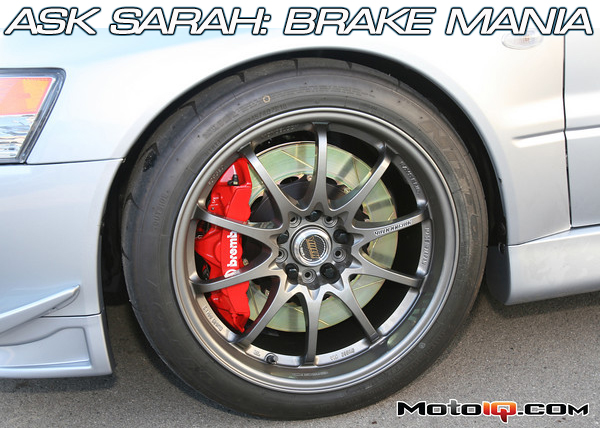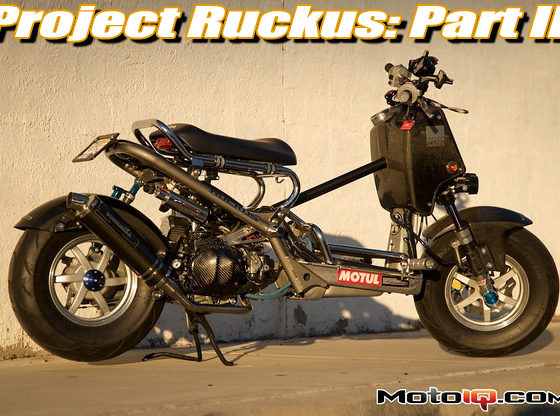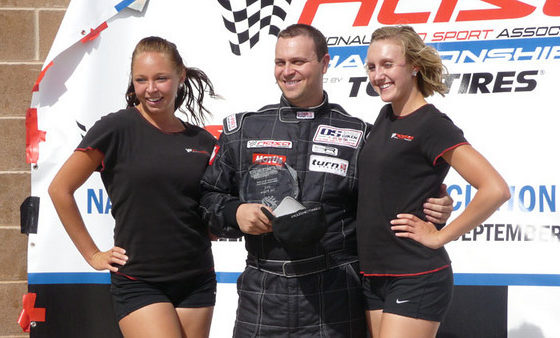,
 |
| Project Mu makes a line of excellent brake pads ranging from high performance street to hard core endurance racing |
 |
| If you have a spongy pedal, the first thing you should do is bleed your brakes |
A very common question I get asked a lot: “The brake pedal goes straight to the floor in my Taurus / Accord / Eclipse / insert car here. What gives?”
First, bleed your brakes to get out all air in the brake lines and also check your brake fluid. Low brake fluid can cause a longer pedal feel. Worn brake pads can lead to low brake fluid as the fluid will try to fill in the void in the calipers as the pistons extend. If the fluid in the master cylinder is low, check for fluid leaks (wet spots) around the hoses and line connections at the wheels as well as fluid leaking from the rear of the brake master cylinder. Check the calipers and wheel cylinders as well. If the brake warning light is not on, the master cylinder is full, and you can't find any leaks, the master cylinder seals could be worn or leaking internally and the brake pedal will gently sink to the floor when braking under normal circumstances, though it may stay somewhat firm on hard braking. A bad master cylinder seal is especially noticeable when stopped. You may even have to keep pumping the brake pedal to keep the car from creeping ahead. If this is the case, replace the master cylinder and bleed and flush the braking system with the correct brake fluid.
 |
| Braided steel Teflon lined brake lines also will improve pedal feel because they don't expend with hydraulic pressure like OEM rubber lines do |
Do I really need to change brake pads if I take my car hotlapping?
Jorge Gallardo
It really depends on how long you’re on the track for and how hard you’re braking during a hotlapping session. Brake pads that are fine for street use may not stand up to the abuse on the track. Brake pad material is made of the friction material and binder. The structure of these two determines the optimal operating temperature of the pad. Hard braking, such as on a road course, can produce temps that exceed a typical street pad's working operating temperature and the coefficient of friction may start to decline, known as pad fade. The binder resin will begin to melt and vaporize and the pad will slide on the vapor layer between the pad and rotor, causing a gradual decline in pedal feel and requiring more pedal pressure to stop. If continued for a long period of time, temperatures will increase even more and could contribute to fluid fade. Fluid fade is caused by the brake fluid boiling inside the calipers causing compressible gas bubbles. Even if you get the brakes back, any high temperatures or hard braking could contribute to sudden fade again. The high temperatures could also permanently glaze the pads, and in a worst case scenario, the pads will break apart and the piston could wear through the backing plate, producing a total loss of hydraulic pressure in the brake system! Race pads offer better stopping power at higher temperatures, but aren’t as great as street pads when cold. They also eat rotors if not up to race temperatures. If you do go invest in some good race pads, you should swap out your rotors at the track as well so the race pads don't eat up your everyday rotors. Cross-drilled or slotted rotors can also decrease the chances of pad fade because they allow the vapors to escape more easily although drilled rotors tend to crack. Also take advantage of a cool down lap before you drive off the track.



